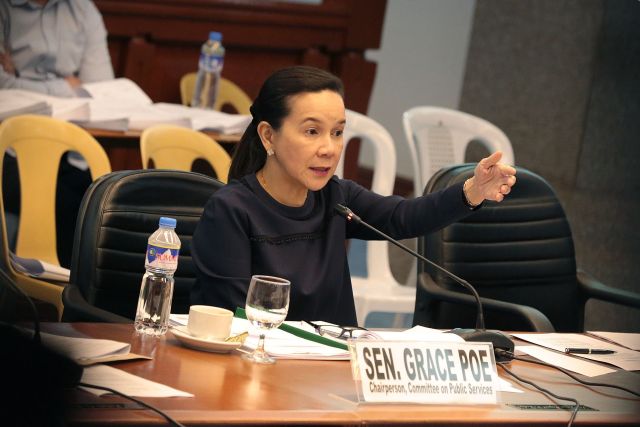
Senator Grace Poe
MANILA, Philippines – Senator Grace Poe is appealing to her colleagues to give the Freedom of Information (FOI) bill “one big push” in the 18th Congress as she refiled the measure on Tuesday.
Senate Bill No. 121 or the “People’s Freedom of Information Act of 2019” was among the first 10 measures that Poe filed for the 18th Congress.
“Karapatan ng ating mga kababayan na malaman ang ginagawa ng pamahalaan. Wala dapat under-the-table na negosasyon, walang sekreto,” Poe said in a press release.
“I appeal to our colleagues to give this bill one big push this 18th Congress so we will finally have an FOI law,” she added.
Poe spearheaded the approval of the bill on third and final reading in 2014 as chairperson of the Senate public information committee.
She then filed her version of the bill in 2016 and sponsored it on the floor.
Poe insisted that an FOI law will strengthen the existing Executive Order No. 2 that operationalizes FOI but only in the Executive branch.
MORE STORIES
Misamis solon asks Customs to inspect over 800 possible trash shipments
Paolo Duterte’s joining Speakership race surprises Inday Sara
2 arrested for alleged extortion of vendors in Manila
She explained that the proposed measure, which is an enhanced version of her previous bill, has considered and incorporated inputs and ideas of various stakeholders from the previous Congresses.
“Transparency is essential to accountability. Without transparency, citizens cannot access the information needed to collectively discern the fitness of public officials, elected otherwise, to hold public office,” Poe said in the explanatory note of the bill.
Under the proposed measure, every Filipino has a “right to and shall, on request, be given access to any information of public concern under the control of a government agency…”
No request for information shall be denied, except if it falls under the exceptions where the information could not be divulged.
The statement of assets, liabilities and network (SALN) of the following officials are required to be posted in their official websites: President, Vice-President, members of the Cabinet, members of Congress, justices of the Supreme Court, members of the Constitutional Commissions and other constitutional offices and officers of the armed forces with general or flag rank.
Poe, however, noted that access of information is “not absolute” as there are documents that need to be kept confidential such as those directly relating to national security or defense or if their disclosure may cause damage to the national security or internal and external defense of the State.
Included in the exceptions provided under the bill are information about foreign affairs of the country; trade secrets and commercial or financial information; personal and sensitive information of a person; those that transpired in the executive session in Congress, among others.
The bill mandates that information exempted from disclosure must be reviewed after every three years by the head of office or agency for reclassification and possible disclosure.
A provision in the bill also states that every government agency shall endeavor to use plain language in their communication orders, compliance, requirements or instructions issued to the requesting party.
The government agencies shall also translate key information into major Filipino languages and present them in popular form and means.
The penalty of imprisonment of not less than one month but not more than six months and a fine from P10,000 to P100,000 shall be imposed upon any public official or employee who falsely denies or conceals the existence of information or destroys information being requested, or those who release information included in the list of exceptions. (Editor: Gilbert S. Gaviola)
Disclaimer: The comments uploaded on this site do not necessarily represent or reflect the views of management and owner of Cebudailynews. We reserve the right to exclude comments that we deem to be inconsistent with our editorial standards.
